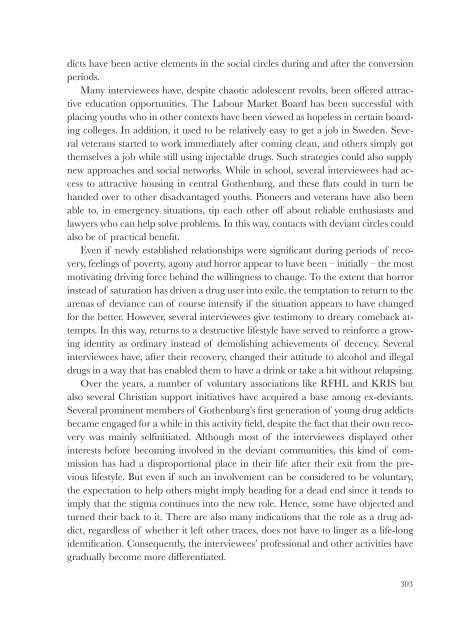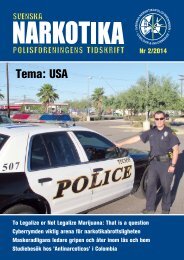- Page 1 and 2:
Vänskap värden vandel Avvikelser
- Page 3 and 4:
Christer Ahlman Vänskap, värden,
- Page 5:
Till Birgit, Gunilla och Ingrid
- Page 9 and 10:
Innehållsförteckning Förord 7 DE
- Page 11 and 12:
Kapitel 4. Marknadsplatser, träffp
- Page 13:
Sammanfattning 235 Jagpositioner oc
- Page 16 and 17:
stöttande kallelse för att orka m
- Page 19 and 20:
KAPITEL 1 Introduktion, positionsbe
- Page 21 and 22:
om självläkning och naturlig åte
- Page 23 and 24:
sysselsättningen i form av krimine
- Page 25 and 26:
droger förefaller det vara sämre
- Page 27 and 28:
Avhandlingens syften konkretiseras
- Page 29 and 30:
för att utbyta insiderinformation
- Page 31 and 32:
att vara konstnärlig vinpimplarboh
- Page 33 and 34:
systems, to other empirical units o
- Page 35 and 36:
i sin tur upplevelse av ett polismo
- Page 37 and 38:
styrda och situationsbetingade. Exe
- Page 39 and 40:
Obönhörlig socialitet och smärts
- Page 41 and 42:
KAPITEL 2 Metod, empiri, analys och
- Page 43 and 44:
Veteraner: Ungdomar som injicerade
- Page 45 and 46:
vuxit till i samklang med analysen.
- Page 47 and 48:
Självbiografisk förvandlingslitte
- Page 49 and 50:
länder och världsdelar. 24 Hur va
- Page 51 and 52:
Livshistoriens logik, koherens och
- Page 53 and 54:
ordinära människor och hur presen
- Page 55 and 56:
via de delar av samtalen som finns
- Page 57 and 58:
1960-talet har dock förblivit den
- Page 59 and 60:
Vid 22 års ålder var jag gravt pa
- Page 61 and 62:
naturligtvis få en mer generell be
- Page 63 and 64:
observation. Att interaktionistiska
- Page 65 and 66:
medla eller leva sig in i medelst a
- Page 67 and 68:
påpekar, helt enkelt att minnas de
- Page 69 and 70:
eller thinner kan därtill göra at
- Page 71 and 72:
med hjälp av sådana berättelser
- Page 73 and 74:
språk och verklighet. Jag antar at
- Page 75 and 76:
Växelspelet mellan konversation, i
- Page 77 and 78:
Att intervjua en dödspolare Även
- Page 79 and 80:
under sådana omständigheter accep
- Page 81 and 82:
flertalet återhämtat sig efter m
- Page 83:
DEL 2 Från läkemedelsberoende via
- Page 86 and 87:
givande konstruktion har varit en h
- Page 89 and 90:
KAPITEL 3 Göteborgs första genera
- Page 91 and 92:
1960-talet fick uppleva sin jungfru
- Page 93 and 94:
Kvartersgäng och centrumgäng Port
- Page 95 and 96:
det var ju det här med injicerande
- Page 97 and 98:
som misslyckats i andra sammanhang
- Page 99 and 100:
”Det var stora ungdomsgäng som h
- Page 101 and 102:
Mot mitten av 1960-talet, något ti
- Page 103:
ovan hade också jag mött något h
- Page 106 and 107:
intervjuad beskriver som en ”ragg
- Page 108 and 109:
1930-talet”. I de västra stadsde
- Page 110 and 111:
obetydlig. Under huvuddelen av 1960
- Page 112 and 113:
erhålla de mest åtråvärda recep
- Page 114 and 115:
ett framträdande inslag bland mån
- Page 116 and 117:
kunde mycket väl ligga framme i ce
- Page 118 and 119:
ännu en gång för att utkräva n
- Page 120 and 121:
”På så vis var det ju väldigt
- Page 122 and 123:
eller rövare och fajter skulle eft
- Page 125 and 126:
KAPITEL 5 Handeln likriktas och pun
- Page 127 and 128:
tecknad med ett C. 89 Även om den
- Page 129 and 130:
mans avskrap”. Sammantagna kunde
- Page 131 and 132:
Våningar, kvartar och kneg Den all
- Page 133 and 134:
familjemedlemmar och i gynnsamma fa
- Page 135:
antal kriminella unga män med ett
- Page 139 and 140:
KAPITEL 6 Uppväxtvillkor De förv
- Page 141 and 142:
narkotikainjektioner kan ställas i
- Page 143 and 144:
uppväxten heller inte som lika ent
- Page 145 and 146:
Några män ur borgerliga led berä
- Page 147 and 148:
fall blev det aldrig aktuellt att s
- Page 149 and 150:
åren har de hamnat i avvikande gä
- Page 151 and 152:
hur dom har drabbats.” Av denna u
- Page 153 and 154:
Arbetargrabbarna berättar om berus
- Page 155 and 156:
mig igen” berättar en av dem. 10
- Page 157:
Sammanfattning Fasader, roller och
- Page 160 and 161:
Så hur mycket av sina internaliser
- Page 162 and 163:
Även om han knyter sitt livsöde t
- Page 164 and 165:
elationer skänkte mening åt våra
- Page 166 and 167:
och internaliserade andre en sådan
- Page 168 and 169:
och hur de sniffrus som varit knute
- Page 170 and 171:
Gamla synder hann emellertid upp ho
- Page 172 and 173:
dana män har lyckats få till stå
- Page 174 and 175:
partners har istället framstått s
- Page 177 and 178:
KAPITEL 8 Förändring När tillvar
- Page 179 and 180:
hunnit arbeta upp ett gott renommé
- Page 181 and 182:
Kvinnornas hållningar, reservation
- Page 183 and 184:
narkoman har hon ändå till slut l
- Page 185 and 186:
Från alkohol till narkotika och å
- Page 187 and 188:
perioder, ibland för alltid, kunna
- Page 189 and 190:
Från läkemedelskonsumtion via mis
- Page 191 and 192:
nat” liv som läkemedelsförbruka
- Page 193 and 194:
periodvis kunnat vara nog så egena
- Page 195 and 196:
KAPITEL 9 Kraftkällor och andra om
- Page 197 and 198:
att tappa tålamodet och låsa hono
- Page 199 and 200:
föräldrarna senare nödgades inkv
- Page 201 and 202:
stjälas”, kommer ibland till anv
- Page 203 and 204:
också att han i samma skede var
- Page 205 and 206:
tyder också på att moralisk uppru
- Page 207 and 208:
manipulerad av en mor som försökt
- Page 209 and 210:
som sin vändpunkt. 138 Under samma
- Page 211 and 212:
lättast att jobba med sådana.”
- Page 213 and 214:
känsla. En man uppvuxen i ett prol
- Page 215 and 216:
elation med en dittills obekant man
- Page 217:
kunnat utmynna i psykotiska tillst
- Page 220 and 221:
Redan från början har materialets
- Page 222 and 223:
på drift. När en tidigt engagerad
- Page 224 and 225:
över sina omedelbara emotioner och
- Page 226 and 227:
sitt första ”mogna” förhålla
- Page 228 and 229:
lovningen med pojkvännen upphörde
- Page 230 and 231:
mina polares hållning. Kanske kan
- Page 233 and 234:
KAPITEL 11 Hierarkier, roller och s
- Page 235 and 236:
differentiering (genom avgränsning
- Page 237 and 238:
Avgränsad etik och värdighetskamp
- Page 239 and 240:
svart eller vitt va.” En kvinna m
- Page 241 and 242:
titetens sammanbrott i moderniteten
- Page 243 and 244:
vissa religiösa omvändelser 162 ,
- Page 245 and 246:
lyckas nå fram till eller orkar oc
- Page 247 and 248:
Jaget: o o Jagcirklarnas diameter k
- Page 249 and 250:
självbildningen på rolltagandet (
- Page 251 and 252:
KAPITEL 12 Betydelsefulla händelse
- Page 253 and 254:
Handlingar som blottar etikens egg
- Page 255 and 256:
Sist men inte minst: kan dödscellf
- Page 257 and 258:
längst in för de allra grövsta o
- Page 259 and 260: alternativ tillhörighet. Men reste
- Page 261 and 262: våldsman som i hotfulla sammanhang
- Page 263 and 264: när en överlagrande roll skalats
- Page 265 and 266: stå som en negativ personlig egens
- Page 267 and 268: Inkapslade roller, exroller och fre
- Page 269 and 270: samtidigt de mest värdighetsberöv
- Page 271 and 272: För mig blir det också klarare va
- Page 273: människor med mer positiva, lättf
- Page 277 and 278: KAPITEL 13 Sammanfattning och sluto
- Page 279 and 280: och en känsla av att vi levt under
- Page 281 and 282: Enligt Andersson (1991) kan kvalifi
- Page 283 and 284: en strävan efter märkvärdighet o
- Page 285 and 286: kom över sina doser legalt och dem
- Page 287 and 288: Avsöndrad, nedvärderad och existe
- Page 289 and 290: maka, gammal polare, pånyttfödd k
- Page 291 and 292: från vissa håll så länge de tro
- Page 294 and 295: Referenser Litteratur Abrams, Phili
- Page 296 and 297: Durkheim, Emile (1951) ”Types of
- Page 298 and 299: Klingemann, Harald & Linda Carter S
- Page 300 and 301: Saviano, Roberto (2007) Gomorra. St
- Page 302 and 303: Ordlista Absint: A-lag: Blöta: Bof
- Page 304 and 305: Lyst: Efterlyst av polisen Mackling
- Page 307 and 308: Summary Friendship, Values and Mora
- Page 309: I also try to illuminate the condit



